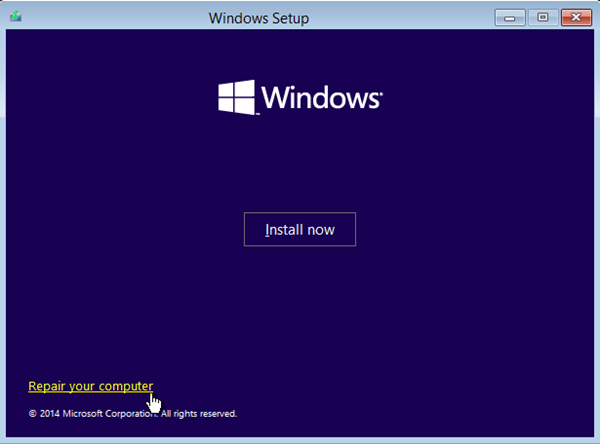Repair Windows computer using Installation Media
The steps involved to repair Windows 11/10 installation using the bootable Installation USB or DVD media are: If you cannot boot into Windows 11/10 and cannot access your files, Windows Startup Repair can fix some of the most common problems using the advanced recovery method. Your data will not be lost during the repair process.
1] Download Windows ISO
While not compulsory, make sure to download the same Windows ISO version as installed on your computer. The Advanced troubleshooter is not dependent on the Windows version but can come in handy when you need to install a fresh copy of Windows.
2] Create Bootable USB or DVD drive
Once you have the ISO, use one of these tools to create a bootable USB drive. Next, boot into the BIOS or UEFI of your computer, and select the USB device as the first boot device, followed by the hard disk. We recommend using Rufus, as it can download the ISO as well.
3] Boot from the media and choose “Repair your computer.”
When you boot from the USB drive, it will kickstart Windows 10 installation. Do not have a craving to keep hitting next, or you will end up installing Windows. On the first installation screen, look for a link “Repair your computer.” Click on it. It will boot your computer into Advanced Recovery.
4] Under Advanced troubleshooting
When at the advanced troubleshooting, select Advanced Options.
Select Troubleshoot.
Under the Advanced options screen, you will see Startup Repair.
Click on it and follow the instructions. This solution will fix the problems which don’t allow you to boot into the computer. In the next screen, it will display the admin account with its name. Click on it, and verify using the account password related to the email associated with it.
After verification, it will start diagnosing the computer and resolve any issue related to the boot. This post will help you in case this step fails and you are stuck on diagnosing your PC screen.
Once the problem is resolved, the computer should reboot as usual, and you should be able to use it. The process doesn’t wipe or delete personal files from your account, so you don’t have to worry about it. Post that may help you if your computer does not boot:
Windows PC will not boot up or startWindows Startup & Boot problems – Advanced Troubleshooting
How do I repair corrupted Windows 11/10?
If you are not able to boot into Windows PC i.e., cannot access login screen, because of corruption, you can repair it using bootable USB media. Once you have it, make sure to change the boot order to USB in the BIOS or UEFI to boot using the USB drive. While it will show a regular Windows installation, the option to repair Windows appear right at the bottom left of the screen. It will then reveal the advanced recovery mode. Locate the Command Prompt in the tools, and then run the following DISM Tools and System File Checker command. Once the repair is done, restart the computer, and you should be able to boot into Windows. If the MBR of the PC is missing, you can use the bootrec /FixMbr command.
How do I repair Windows 11/10 with Command Prompt?
Similar to the above option, if you can log in to Windows 10 and use it to repair Windows. It comes in handy when some of your system files are corrupt, resulting in errors. Use the DISM and SFC command to fix the problem. The commands will need admin permission to execute and complete the repair.
How do I repair Windows 11/10 with USB?
It means you need to create a bootable USB drive, then use it to boot into Advanced Recovery. Then use the command tool to run the commands to fix any corrupt file which might be blocking the PC to boot in the normal way. If you need to perform Startup Repair, this is the right way to do it.
Can you still upgrade to Windows 10 for free?
Yes, you can if you have a valid Windows license key. That means if you are running an activated version of Windows, you can use the Windows 11/10 installer to upgrade Windows. In case you don’t, it may not be possible to do it. You will need to buy a new license key to activate Windows. When upgrading, the installer will check for compatibility of the hardware and software. Make sure to take a backup of your personal files and then upgrade. I hope the post was easy to follow, and you were able to repair Windows 11/10 or boot into Windows using the Media Installation guide.
